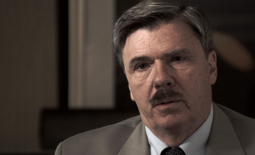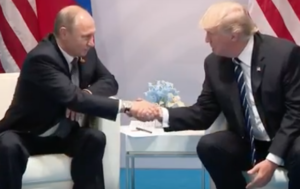
Robert Parry
Investigative reporter Robert Parry broke many of the Iran-Contra stories for The Associated Press and Newsweek in the 1980s. You can buy his latest book, America’s Stolen Narrative, either in print here or as an e-book (from Amazon and barnesandnoble.com).
Exclusive: After a half year in office, President Trump is stumbling toward a "reality TV” irrelevance or worse, but a narrow path remains to make a historically important contribution to the nation, writes Robert Parry.
On June 29, when CNN’s Wolf Blitzer asked John Podesta, the chairman of Hillary Clinton’s failed presidential campaign, how they had lost to Donald Trump, I expected the usual excuse – "Russia! Russia! Russia!” – but was surprised when Podesta spoke truthfully:

Russian President Vladimir Putin meets with U.S. President Donald Trump at the G-20 summit in Hamburg, Germany, on July 7, 2017. (Screen shot from Whitehouse.gov)
"Even though 20 percent of his voters believed he was unfit to be president, they wanted radical change, they wanted to blow the system up. And that’s what he’s given them, I guess.”
For those millions of Americans who had watched their jobs vanish and their communities decay, it was a bit like prisoners being loaded onto a truck for transport to a killing field. As dangerous and deadly as a desperate uprising might be, what did they have to lose?
In 2008, some of those same Americans had voted for an unlikely candidate, first-term Sen. Barack Obama, hoping for his promised "change you can believe in,” but then saw Obama sucked into Official Washington’s Establishment with its benign – if not malign – neglect for the average Joe and Jane.
In 2016, the Democratic Party brushed aside the left-wing populist Sen. Bernie Sanders, who might have retained the support of many blue-collar Americans. The party instead delivered the Democratic nomination to the quintessential insider candidate – former First Lady, former Senator and former Secretary of State Hillary Clinton.
Though coming from a modest background, Clinton had grabbed onto the privileges of power with both hands. She haughtily set up a private email server for her official State Department business; she joined with neocons and liberal interventionists in pushing for "regime change” wars fought primarily by young working-class men and women; and after leaving government, she greedily took millions of dollars in speaking fees from Wall Street and other special interests.
Clinton’s contempt for many American commoners spilled out when she labeled half of Trump’s supporters "deplorables,” though she later lowered her percentage estimate.
So, enough blue-collar voters in Michigan, Wisconsin and Pennsylvania rebelled against the prospect of more of the same and took a risk on the disruptive real-estate mogul and reality-TV star Donald Trump, a guy who knew little about government and boasted of his crude sexual practices.
Hobbling Trump
However, after Trump’s shocking victory last November, two new problems emerged. First, Hillary Clinton and the national Democrats – unwilling to recognize their own culpability for Trump’s victory – blamed their fiasco on Russia, touching off a New Cold War hysteria and using that frenzy to hobble, if not destroy, Trump’s presidency.
Second, Trump lacked any coherent governing philosophy or a clear-eyed understanding of global conflicts. On foreign policy, most prospective Republican advisers came from a poisoned well contaminated by neocon groupthinks about war and "regime change.”
Looking for alternatives, Trump turned to some fellow neophytes, such as his son-in-law Jared Kushner and alt-right guru Steve Bannon, as well as to a few Washington outsiders, such as former Defense Intelligence Agency director Michael Flynn and Exxon-Mobil chief executive officer Rex Tillerson. But all had serious limitations.
For instance, Kushner fancied himself the genius who could achieve Israeli-Palestinian peace by applying the so-called "outside/in strategy,” i.e., getting the Saudis and Gulf States to put their boots on the necks of the Palestinians until they agreed to whatever land-grabbing terms Israeli Prime Minister Benjamin Netanyahu dictated.
Flynn, who served briefly as Trump’s National Security Adviser, had led the DIA when it correctly warned President Obama about the jihadist risks posed by supporting the "regime change” project in Syria, even predicting the rise of the Islamic State.
But Flynn, like many on the Right, bought into Official Washington’s false groupthink that Iran was the principal sponsor of terrorism and needed to be bomb-bomb-bombed, not dealt with diplomatically as Obama did in negotiating tight constraints on Iran’s nuclear program. The bomb-bomb-bomb approach fit with the desires of the Israeli and Saudi governments, which viewed Iran as a rival and wanted the American military to do the dirty work in shattering the so-called "Shiite crescent.”
So, because of Kushner’s views on Israel-Palestine and because of the Flynn/Right-Wing hostility toward Iran, Trump fell in line with much of the neocon consensus on the Middle East, demonstrated by Trump’s choice of Saudi Arabia and Israel for his first high-profile foreign trip.
But obeisance to Israel and Saudi Arabia – and inside Washington to the neocons – is what created the catastrophe that has devastated U.S. foreign policy and has wasted trillions of dollars that otherwise could have been invested in the decaying American infrastructure and in making the U.S. economy more competitive.
In other words, if Trump had any hope of "making America great again,” he needed to break with the Israeli/Saudi/neocon/liberal-hawk groupthinks, rather than bow to them. Yet, Trump now finds himself hemmed in by Official Washington’s Russia-gate obsession, including near-unanimous congressional demands for more sanctions against Moscow over the still-unproven charges that Russia interfered with the U.S. election to help Trump and hurt Clinton. (The White House has indicated that Trump will consent to his own handcuffing on Russia.)
A Daunting Task
Even if Trump had the knowledge and experience to understand what it would take to resist the powerful foreign-policy establishment, he would face a hard battle that could only be fought and won with savvy and skill.

Marine Corps Gen. Joe Dunford, chairman of the Joint Chiefs of Staff, walks with Army Lt. Gen. Stephen J. Townsend, the commander of Combined Joint Task Force Operation Inherent Resolve; Jared Kushner, senior advisor to President Donald J. Trump; and U.S. Ambassador to Iraq Douglas A. Silliman after arriving in Baghdad, April 3, 2017. (DoD photo by Navy Petty Officer 2nd Class Dominique A. Pineiro)
A narrow path toward a transformational presidency still remains for Trump, but he would have to travel in some very different directions than he has chosen during his first six months.
For one, Trump would have to go against type and become an unlikely champion for truth by correcting much of the recent historical record about current global hot spots.
On Syria, for instance, Trump could open up the CIA’s books on key events, including the truth about Obama’s "regime change” scheme and the alleged sarin gas attackoutside Damascus on Aug. 21, 2013. Though the Obama administration blamed the Assad government, other evidence pointed to a provocation by radical jihadists trying to trick the U.S. military into intervening on their side.
Similarly, on the Ukraine crisis, Trump could order the CIA to reveal the truth about the U.S. role in fomenting the violent coup that ousted elected President Viktor Yanukovych and touched off a bloody civil war, which saw the U.S.-backed regime in Kiev dispatch neo-Nazi militias to kill ethnic Russians in the east.
In other words, facts could be deployed to counter the propaganda theme of a "Russian invasion” of Ukraine, another one of Official Washington’s beloved groupthinks that has become the foundation for a dangerous New Cold War.
As part of the truth-telling, Trump could disclose the CIA’s full knowledge about who shot down Malaysia Airlines Flight 17 over eastern Ukraine on July 17, 2014, an atrocity killing 298 people that was pinned on the Russians although other evidence points to a rogue element of the Ukrainian military. [See here and here.]
Further going against type, Trump also might admit that he rushed to judgment following the April 4, 2017, chemical-weapons incident in Khan Sheikhoun, Syria, by ordering a retaliatory missile strike against the Syrian military on April 6 when the whodunit evidence was unclear.
By sharing knowledge with the American people – rather than keeping them in the dark and feeding them a steady diet of propaganda – Trump could enlist popular support for pragmatic shifts in U.S. foreign policy.
Those changes could include a historic break from the Israeli-Saudi stranglehold on U.S. policy in the Middle East – and could make way for cooperation with Russia and Iran in stabilizing and rebuilding Syria so millions of displaced Syrians could return to their homes and reduce social pressures that the refugees have created in Europe.
A Populist Party
On the domestic front, if Trump really wants to replace Obama’s Affordable Care Act with something better, he could propose the one logical alternative that would both help his blue-collar supporters and make American companies more competitive – a single-payer system that uses higher taxes on the rich and some more broad-based taxes to finance health-care for all.
That way U.S. corporations would no longer be burdened with high costs for health insurance and could raise wages for workers and/or lower prices for American products on the global market. Trump could do something similar regarding universal college education, which would further boost American productivity.
By taking this unorthodox approach, Trump could reorient American politics for a generation, with Republicans emerging as a populist party focused on the needs of the country’s forgotten citizens, on rebuilding the nation’s physical and economic infrastructure, and on genuine U.S. security requirements abroad, not the desires of "allies” with powerful lobbies in Washington.
To follow such a course would, of course, put Trump at odds with much of the Republican Party’s establishment and its longstanding priorities of "tax cuts for the rich” and more militarism abroad.
A populist strategy also would leave the national Democrats with a stark choice, either continue sidling up to Official Washington’s neoconservatives on foreign policy and to Wall Street’s wheelers and dealers on the economy – or return to the party’s roots as the political voice for the common man and woman.
But do I think any of this will happen? Not really. Far more likely, the Trump presidency will remain mired in its "reality-TV” squabbles with the sort of coarse language that would normally be bleeped out of network TV; the Democrats will continue substituting the Russia-gate blame-game for any serious soul-searching; the Republicans will press on with more tax cuts for the rich; and the Great American Experiment with Democracy will continue to flounder into chaos.




.jpg/250px-ElbeDay1945_(NARA_ww2-121).jpg)





